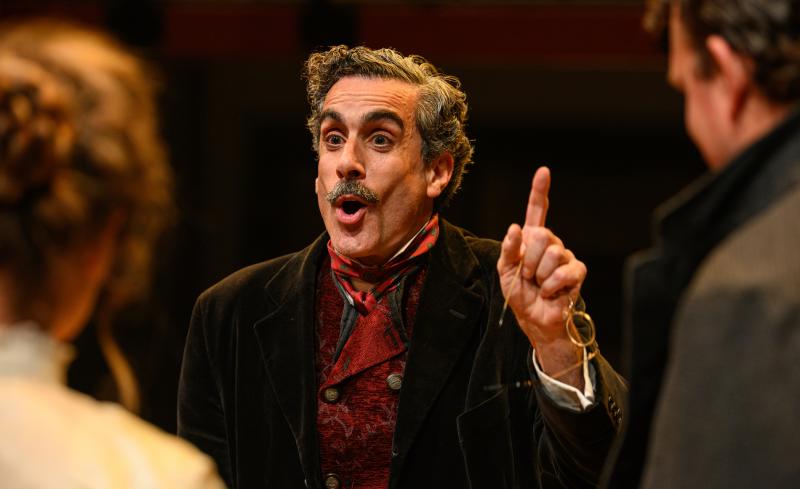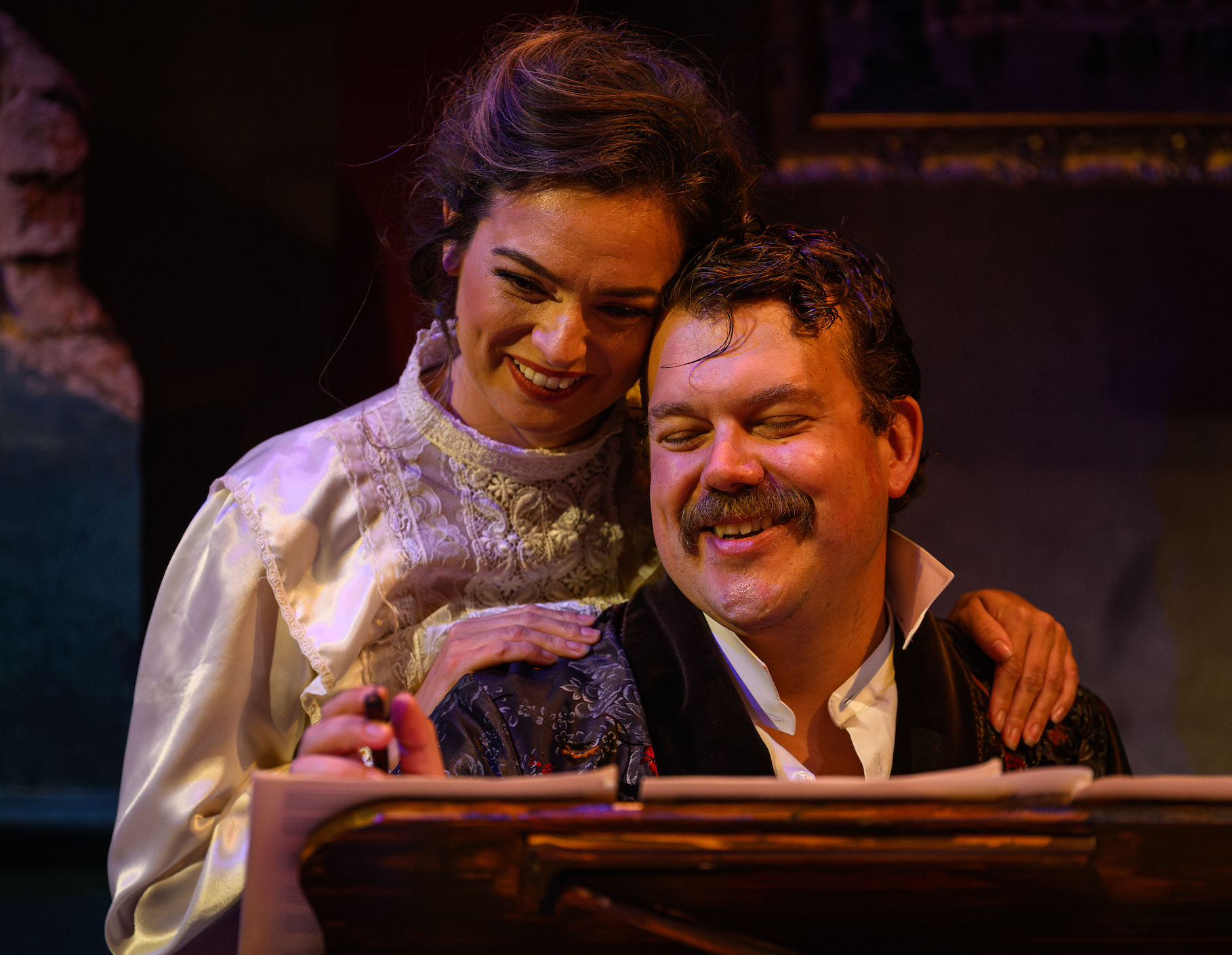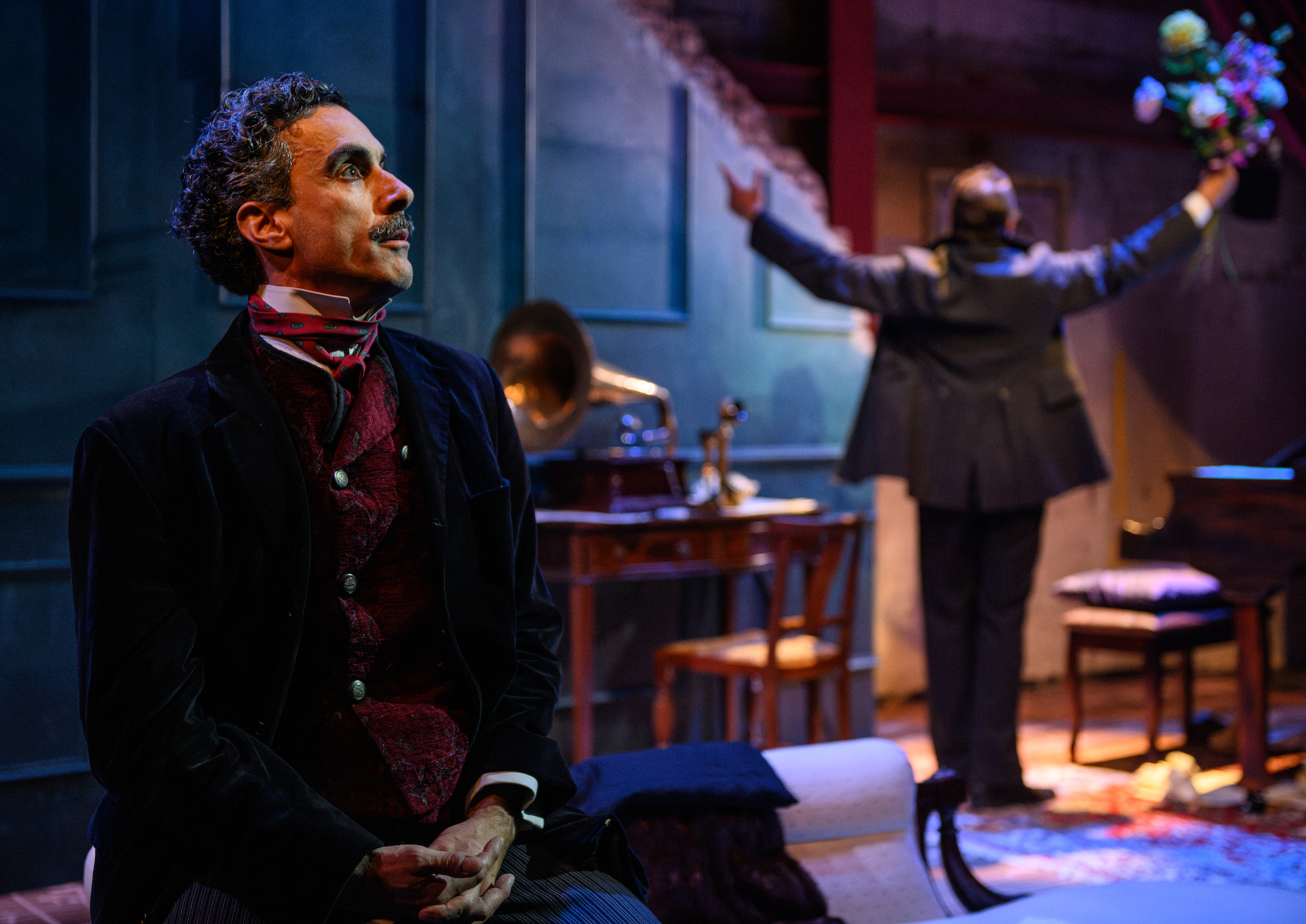That Bastard, Puccini!, Park Theatre review - inventive comic staging of the battle of the Bohèmes | reviews, news & interviews
That Bastard, Puccini!, Park Theatre review - inventive comic staging of the battle of the Bohèmes
That Bastard, Puccini!, Park Theatre review - inventive comic staging of the battle of the Bohèmes
James Inverne enjoyably reconstructs the rivalry between Puccini and Leoncavallo

Before Luigi Illica wrote the libretti for Puccini’s Tosca and Madama Butterfly, he had joined the composer as the librettist in a race to stage the first production of La Bohème. The race was against Ruggero Leoncavallo, a composer Illica had once collaborated with on a libretto – for Puccini, his Manon Lescaut.
In the snakepit of the Milanese opera business in the late 1800s, these tangled connections were standard, as dozens of young composers fought for prominence to be the new Verdi, whose portrait hangs on Leoncavallo's wall. That there would be rival productions based on Henri Murger’s Scènes de la vie de bohème (1851) isn’t too surprising. That they seem to have been conceived, 40 years after publication, within months of each other and premiered six months apart, looks more suspicious. Especially as Puccini “had previous” as a recycler of others’ ideas, such as his version of the Abbé Prevost’s moral tale of Manon Lescaut, which had appeared nine years after Massenet’s.
 Leoncavallo had contributed to the libretto of Puccini's Manon Lescaut, then went on to have a big hit with I Pagliacci. But his future as an operatic great depended on a second hit. He was staking all on his Bohème, until he received news of Puccini’s twin project.
Leoncavallo had contributed to the libretto of Puccini's Manon Lescaut, then went on to have a big hit with I Pagliacci. But his future as an operatic great depended on a second hit. He was staking all on his Bohème, until he received news of Puccini’s twin project.
The ingenuity of James Inverne’s new play about this battle is that he projects it as a comedy of clashing artistic egos: Leoncavallo the unhappy man staring at also-ran status and boosted only by his wife Berthe’s support; Puccini the self-promoting rising star, revelling in his racy reputation as a ladies’ man, confident of his own genius. Equally astute was Inverne’s decision to stage the piece using just three actors. Here, Sebastien Torkia plays Puccini, Alasdair Buchan (pictured above right with Lisa-Anne Wood) Leoncavallo and LIsa-Anne Wood his wife Berthe. The cast are then required to literally don hats and accessories to play other dramatis personae, notably Puccini’s future wife, Elvira, and an increasingly sought after Austrian conductor, Gustav Mahler, whose patronage Leoncavallo urgently pursues.
The action plays out as if it’s a retrospective postmortem from many years hence of the two composers’ rivalry, with Puccini as narrator. It begins with the Leoncavallo expletive that provides the play’s title when he discovers what Puccini is doing, then goes all the way through to the period after the battle is over. Oddly, it’s like the technique used by Peter Schaffer in Amadeus, another tale of a bitter artistic ding-dong, of using a character to step out of the stage action and address the audience. All takes place on a simple set featuring a chaise longue, a grand piano, a wind-up gramophone, a drinks trolley, a wood floor with a score gouged into it and a panelled wall with doors through which items appear – a hat, a telephone. A red velvet curtain in one corner provides the two men’s curtain calls when their operas are staged. The chaise converts to a gondola when Leoncavallo's Bohème is staged at La Fenice in Venice. It’s neatly done, keeping the pace nicely smooth.
All takes place on a simple set featuring a chaise longue, a grand piano, a wind-up gramophone, a drinks trolley, a wood floor with a score gouged into it and a panelled wall with doors through which items appear – a hat, a telephone. A red velvet curtain in one corner provides the two men’s curtain calls when their operas are staged. The chaise converts to a gondola when Leoncavallo's Bohème is staged at La Fenice in Venice. It’s neatly done, keeping the pace nicely smooth.
Torkia’s Puccini (pictured above), as in real life, wins the popularity contest. His Puccini is a sparkling-eyed preener, cuttingly witty and clever. There is an air of danger about him, unlike Leoncavallo, whom Buchan projects as a bit of a buffer, kind-hearted and sincere but nowhere near as sophisticated and dashing as his rival. Berthe, a professional singer, is the voice of good sense in his ear, whereas Puccini has a sharp-tongued disenchanted lover, Elvira, who may walk out on him, you sense, if his bad behaviour in various bedrooms becomes too obvious. She delivers a sad, lengthy litany of his misdemeanours almost at the end of the play, where it doesn’t dilute its comedic potential but is rather late in opening our eyes to Puccini’s character.
The cast have huge fun, as do the audience watching them, as they impersonate other characters recruited by Puccini to play out scenes from the story, in particular Mahler, whom Torkia endows with a mad accent, all strangled vowel sounds. (When Berthe is obliged to play Mahler in a subsequent piece of re-enactment, she amusingly mimics the same vocal eccentricities.)
Daniel Slater directs, with a highly inventive touch, what is an entertaining two hours. Inverne raises the question, what is Art? But the answer isn't weighty or pretentious. A key element of the production is allowing the audience to judge which Bohème would have got their vote at the time by making the performers play and sing sections of the works in progress. Inevitably, Puccini wins, Leoncavallo’s arias never really rising above the tepidly conventional, however much wellie Berthe gives them. But Inverne allows the loser a victory more precious to him than fame, a gentle touch to round things off.
- That Bastard, Puccini! at the Park Theatre until 9 August
- More theatre reviews on theartsdesk
rating
Explore topics
Share this article
The future of Arts Journalism
You can stop theartsdesk.com closing!
We urgently need financing to survive. Our fundraising drive has thus far raised £49,000 but we need to reach £100,000 or we will be forced to close. Please contribute here: https://gofund.me/c3f6033d
And if you can forward this information to anyone who might assist, we’d be grateful.

Subscribe to theartsdesk.com
Thank you for continuing to read our work on theartsdesk.com. For unlimited access to every article in its entirety, including our archive of more than 15,000 pieces, we're asking for £5 per month or £40 per year. We feel it's a very good deal, and hope you do too.
To take a subscription now simply click here.
And if you're looking for that extra gift for a friend or family member, why not treat them to a theartsdesk.com gift subscription?
more Theatre
 Deaf Republic, Royal Court review - beautiful images, shame about the words
Staging of Ukrainian-American Ilya Kaminsky’s anti-war poems is too meta-theatrical
Deaf Republic, Royal Court review - beautiful images, shame about the words
Staging of Ukrainian-American Ilya Kaminsky’s anti-war poems is too meta-theatrical
 Laura Benanti: Nobody Cares, Underbelly Boulevard Soho review - Tony winner makes charming, cheeky London debut
Broadway's acclaimed Cinderella, Louise, and Amalia reaches Soho for a welcome one-night stand
Laura Benanti: Nobody Cares, Underbelly Boulevard Soho review - Tony winner makes charming, cheeky London debut
Broadway's acclaimed Cinderella, Louise, and Amalia reaches Soho for a welcome one-night stand
 The Pitchfork Disney, King's Head Theatre review - blazing with dark energy
Thrilling revival of Philip Ridley’s cult classic confirms its legendary status
The Pitchfork Disney, King's Head Theatre review - blazing with dark energy
Thrilling revival of Philip Ridley’s cult classic confirms its legendary status
 Born with Teeth, Wyndham's Theatre review - electric sparring match between Shakespeare and Marlowe
Rival Elizabethan playwrights in an up-to-the-minute encounter
Born with Teeth, Wyndham's Theatre review - electric sparring match between Shakespeare and Marlowe
Rival Elizabethan playwrights in an up-to-the-minute encounter
 Interview, Riverside Studios review - old media vs new in sparky scrap between generations
Robert Sean Leonard and Paten Hughes make worthy sparring partners
Interview, Riverside Studios review - old media vs new in sparky scrap between generations
Robert Sean Leonard and Paten Hughes make worthy sparring partners
 Fat Ham, RSC, Stratford review - it's Hamlet Jim, but not as we know it
An entertaining, positive and contemporary blast!
Fat Ham, RSC, Stratford review - it's Hamlet Jim, but not as we know it
An entertaining, positive and contemporary blast!
 Juniper Blood, Donmar Warehouse review - where ideas and ideals rule the roost
Mike Bartlett’s new state-of-the-agricultural-nation play is beautifully performed
Juniper Blood, Donmar Warehouse review - where ideas and ideals rule the roost
Mike Bartlett’s new state-of-the-agricultural-nation play is beautifully performed
 The Gathered Leaves, Park Theatre review - dated script lifted by nuanced characterisation
The actors skilfully evoke the claustrophobia of family members trying to fake togetherness
The Gathered Leaves, Park Theatre review - dated script lifted by nuanced characterisation
The actors skilfully evoke the claustrophobia of family members trying to fake togetherness
 As You Like It: A Radical Retelling, Edinburgh International Festival 2025 review - breathtakingly audacious, deeply shocking
A cunning ruse leaves audiences facing their own privilege and complicity in Cliff Cardinal's bold theatrical creation
As You Like It: A Radical Retelling, Edinburgh International Festival 2025 review - breathtakingly audacious, deeply shocking
A cunning ruse leaves audiences facing their own privilege and complicity in Cliff Cardinal's bold theatrical creation
 Edinburgh Fringe 2025 reviews: Refuse / Terry's / Sugar
A Ukrainian bin man, an unseen used car dealer and every daddy's dream twink in three contrasting Fringe shows
Edinburgh Fringe 2025 reviews: Refuse / Terry's / Sugar
A Ukrainian bin man, an unseen used car dealer and every daddy's dream twink in three contrasting Fringe shows
 Faustus in Africa!, Edinburgh International Festival 2025 review - deeply flawed
Bringing the Faust legend to comment on colonialism produces bewildering results
Faustus in Africa!, Edinburgh International Festival 2025 review - deeply flawed
Bringing the Faust legend to comment on colonialism produces bewildering results
 Edinburgh Fringe 2025 reviews: Imprints / Courier
A slippery show about memory and a rug-pulling Deliveroo comedy in the latest from the Edinburgh Fringe
Edinburgh Fringe 2025 reviews: Imprints / Courier
A slippery show about memory and a rug-pulling Deliveroo comedy in the latest from the Edinburgh Fringe

Add comment